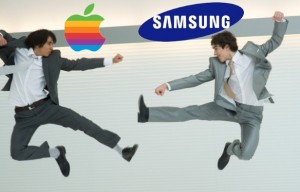[This is my first guest post ever on my blog, and it’s very timely. For those of you who may not know my valued colleague Paul Sparta, who wrote this post, Paul is the former Chairman and CEO of Plateau Systems, Ltd. (until Plateau was acquired by Successfactors before Successfactors was then acquired by SAP) and is currently Executive Chairman of VBrick Systems, Inc. and Managing Director of Acme Nova Partners, LLC. Sparta has worked in the software industry for over twenty years and has published numerous articles regarding enterprise software. He can be found at @PaulSparta on Twitter.
I’m absolutely not a patent expert, and to be quite truthful, I haven’t been following this Apple vs Samsung very closely nor do I have an informed opinion in this matter. But Paul, who’s one of the most capable HR technology executives whom I’ve had the pleasure of knowing, has some very strong opinions in this matter, and I’m delighted to be able to give him a platform for voicing those opinions. Take it away Paul!]
The Apple patent victory over Samsung will have deep and negative consequences for every user and producer of software if the verdict is not overturned or if the damages are not significantly neutered. And, the implications will spill over into HR technology and every corner of enterprise software as well.
For those of you not familiar with software patents and patent litigation, let me boil it down. In software, as Apple and endless others have done, one can patent a method for how something is done.
Here is a legitimately patentable example, “Software method to correlate a person’s cocktail preferences with a person’s automobile purchasing behavior.” This has conceivable business value in that I could pay bars and restaurants to distribute cocktail napkins with the appropriate car dealership advertisements, e.g. order a Margarita and you get a Toyota napkin, order a Negroni, and you get a Fiat napkin (of course). I might want to do this if I owned a few car dealerships.
Now, a software geek will rightly tell you that this is a really easy application to build. A database with a handful of tables, a few queries plus a web interface and voila! I just made an application. This is what thousands of custom software development shops do every day.
But here’s the kicker, I can actually patent this application in the USA, not because it is truly innovative, but simply because I only need to demonstrate to the USPTO that it hasn’t been done before this particular way! Now, I can use this new patent to sue anyone who I think might be doing anything similar to this, with the assumption of validity, because I have a Patent Number from the USPTO saying that it uniquely mine. And it’s even worse. I do not actually have to build and market my cocktail/auto correlation software; I merely need to demonstrate that I had the idea first. I now have a license to blackmail via the legal system, for having produced neither actual innovation nor product. Do you see the absurdity?
If you don’t, here’s a perfect analogy. The patent example above is equivalent to a home builder laying out the configuration of a kitchen, bathroom, bedrooms, and ceilings in a particular way that hasn’t been exactly done before. This happens all the time with custom homes and additions. No one would think that allowing a builder to patent that particular configuration makes any sense at all. After all, assembling these kinds of rooms has been going on for decades with standard methods and procedures. Yet in software, this happens all the time!
What it means for the HR tech and enterprise software world, and you, is that corporations big and small with sufficient legal resources can abuse the patent system to either blackmail legitimate companies (patent trolling) or to create unjustified monopolies on technology, which is exactly what Apple is doing here. This has been going on for years, but never to this scale with so many potentially affected people and companies.
In practice, the matter of granting patents, patent litigation, and patent law is highly complex in its implementation, despite the manifest truths of the simple examples above. This is merely the tip of a giant non-productive, and indeed destructive, iceberg.
It is time for the insanity to stop. Tell your elected representative to work for patent reform, or we’ll all be paying through the nose for patently absurd behavior.
Some resources on the topic:
http://www.patentlysilly.com/ (to fully appreciate the absurdity)
